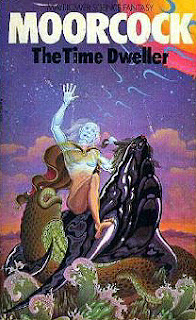Michael Moorcock
Mayflower
The Earth rolled,
salt-choked, round a dying sun. On its bleak inhospitable surface
the last lonely remnants of mankind resigned themselves to extinction.
Time, it seemed, had run out for humanity. Yet Time itself held the key
to survival. If man was to be supplanted from his native planet, perhaps
only infinity would afford him a refuge. Only the age-long clichés with
which his mind was fettered barred him from a whole new dimension--and a
future of unimaginable splendour.
I return to Moorcock every year or two when I find one that I haven't read (there are many) and I found this one in a charity shop during a shopping excursion a few months back. There were a few different ones on the shelf but the hideousness of the cover art on this one made it a sure thing.
It's a selection of shorts and is a bit of a mixed bag in terms of quality but all erring on the side of readability. All 9 stories date from the 1960s and (with two exceptions) were first published in New Worlds magazine of which Moorcock was the then editor.
The first 2 stories share a setting of a future earth where the sun is dim and humanity's days are numbered. It's a nice showcase for Moorcock's more baroque flights of imagination but as a story world it's just too bleak and lackadaisical to make for a satisfying environment.
'The Deep Fix' is a much more interesting prospect of cross dimension shenanigans that falls apart utterly at it's conclusion which was one small step away from '...and it was all a dream.'
'The Golden Barge' felt like vintage weird fiction and presents a delightful and odd little tale of obsession as does both 'Wolf' and 'Consuming Passions' in their ways.
'The Ruins' utterly failed to grab my attention before the book's stand out story, 'The Pleasure Garden of Felipe Sagittarius', took me to a world where Adolf Hitler is a police officer working under Bismark, Kurt Weill runs a bar and an investigation is underway into the death of a man with paper lungs in a garden full of alien plants. Even writing that makes me happy.
The books ends with another slice of sci-fi tinged weird fiction in a tale - 'The Mountain' - that reminded me of Algernon Blackwood's less supernatural moments.
One of the things I like about Moorcock's books is that they rarely have a page count that outstays their welcome. They're quick, imaginative flashes that I can disappear into for a short excursion and emerge sated and refreshed and happy to go elsewhere until I feel the itch again.



No comments:
Post a Comment